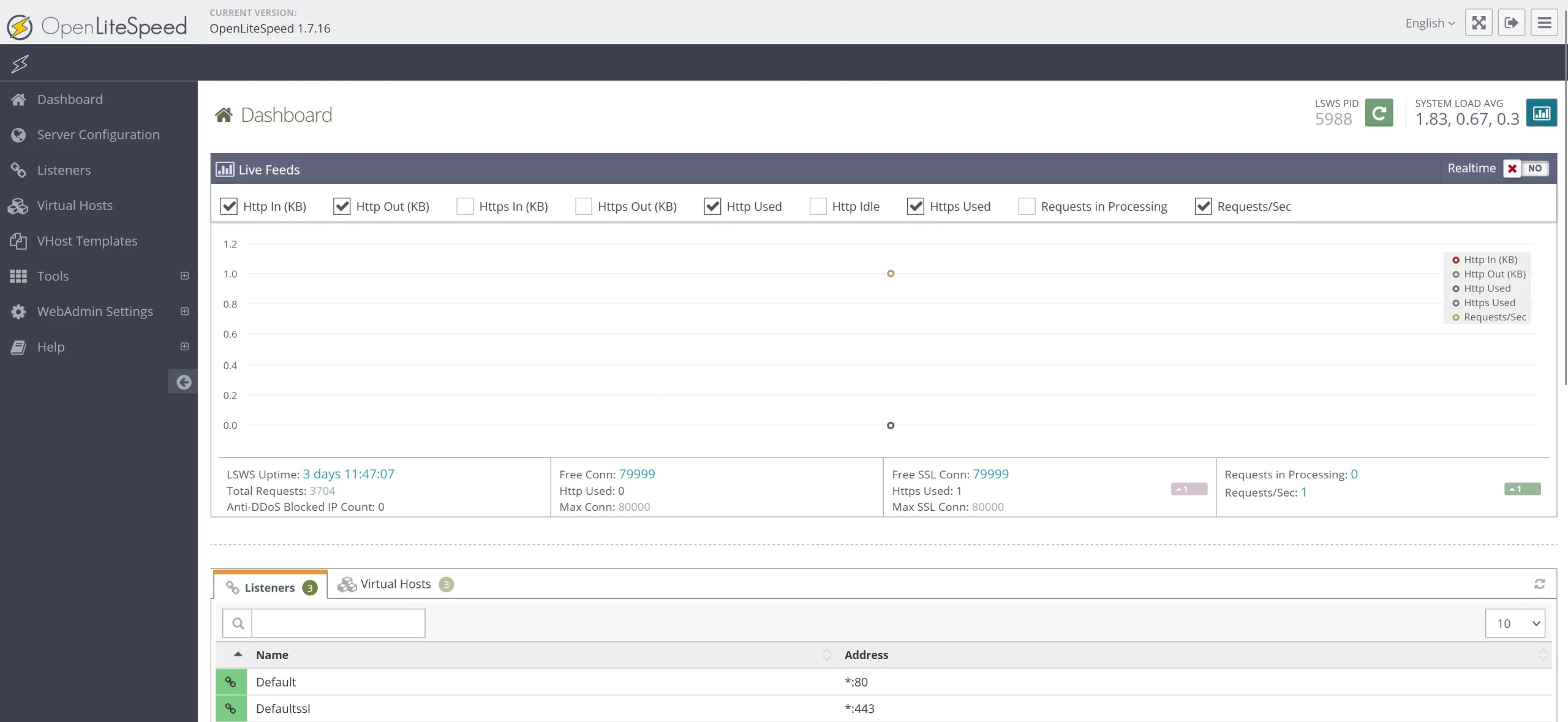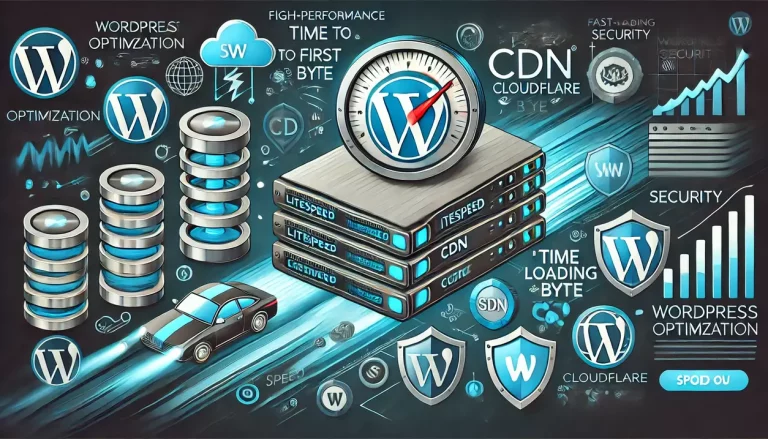A web server is a computer program that serves content, such as web pages, to clients over the internet. It is responsible for receiving requests from clients, processing them, and returning the requested content.
A web server can serve a wide range of content types, including static HTML pages, images, videos, and dynamic content generated by server-side scripting languages such as PHP, Python, or Ruby.
Web servers can run on different operating systems, such as Linux, Windows, or macOS, and can be configured with various software and settings to optimize performance, security, and functionality. The most popular web servers today are Apache, Nginx, and LiteSpeed, each with its own strengths and weaknesses.
Why LiteSpeed is Faster than Apache
There are several reasons why LiteSpeed Web Server may feel faster than Apache when handling PHP and serving general web pages:
- Event-driven architecture: LiteSpeed uses event-driven architecture, while Apache uses process-driven architecture. This means that LiteSpeed can handle more connections with fewer resources, leading to better performance.
- Improved caching: LiteSpeed has advanced caching features that can improve performance. It can cache dynamic content and serve it as static content, reducing the load on the server and improving response times.
- Reduced memory usage: LiteSpeed uses less memory than Apache, which can improve performance on servers with limited resources.
- Better PHP handling: LiteSpeed has a built-in PHP handler, LSAPI, which can handle PHP requests more efficiently than Apache’s mod_php module.
- HTTP/2 support: LiteSpeed has built-in support for the HTTP/2 protocol, which can improve performance by reducing latency and improving network utilization.

Combining these factors can make LiteSpeed feel faster than Apache when serving PHP and general web pages. However, the performance benefits depend on the specific use case and server configuration.
What are the advantages of Apache over LiteSpeed?
While LiteSpeed Web Server has some advantages over Apache, there are also some reasons why Apache may be a better choice for certain use cases. Here are some advantages of Apache over LiteSpeed:
- Wide support and availability: Apache is the most widely used web server on the internet and is available on almost all operating systems. This makes it a popular choice for web hosting companies and system administrators.
- Open-source and free: Apache is open-source software and free to use, which makes it an attractive option for organizations with limited budgets.
- Better support for legacy applications: Apache has been around for a long time and has a wide range of modules and plugins available, making it a better choice for hosting legacy applications that may not be compatible with newer web servers.
- More flexibility: Apache is highly configurable and can be customized to meet the specific needs of a website or application. It also has a large community of developers who create custom modules and plugins to extend its functionality.
- Better support for .htaccess files: Apache allows the use of .htaccess files, which can be used to configure specific directories or files within a website. This can be useful for developers who need to make quick changes to website configurations without modifying the server’s main configuration files.
Apache is a versatile web server that can be customized to meet the needs of a wide range of websites and applications. While LiteSpeed may be faster in certain situations, Apache’s wide support and flexibility make it a popular choice for many organizations.
What about Nginx’s advantages over Apache
Nginx (pronounced “engine-x”) is another popular web server that has gained popularity in recent years. Here are some advantages of Nginx over Apache:
- High performance: Nginx is known for its high performance and low resource usage. It uses an event-driven architecture that allows it to handle a large number of connections with low memory usage.
- Scalability: Nginx is designed to be highly scalable and can handle a large number of requests simultaneously. It can also be used as a load balancer to distribute traffic across multiple servers.
- Reverse proxy capabilities: Nginx has powerful reverse proxy capabilities that can be used to improve website performance and security. It can be used to cache content, compress data, and serve static files, reducing the load on the backend servers.
- Simpler configuration: Nginx has a simpler configuration syntax than Apache, which can make it easier to set up and maintain. It also has a modular architecture that allows you to add or remove functionality as needed.
- Better support for modern protocols: Nginx has built-in support for HTTP/2 and WebSocket, which can improve website performance and enable real-time communication between clients and servers.
Nginx is a high-performance web server that can be a good choice for websites and applications that require high scalability and low resource usage. While Apache may be more flexible and have better support for legacy applications, Nginx’s performance and scalability make it a popular choice for modern web applications.
How does Nginx compare with LiteSpeed?
Nginx and LiteSpeed are both high-performance web servers that offer advantages over Apache in terms of performance and scalability. Here are some key differences between Nginx and LiteSpeed:
- Architecture: Nginx and LiteSpeed use different architectures. Nginx is event-driven and uses a single master process to manage multiple worker processes, while LiteSpeed is also event-driven but uses a hybrid architecture that combines event-driven and process-driven models.
- Support for Apache modules: Nginx does not support Apache modules, while LiteSpeed does. This can be an advantage for organizations that have existing Apache configurations and want to use LiteSpeed as a drop-in replacement.
- Ease of configuration: Nginx has a simpler configuration syntax than Apache or LiteSpeed, which can make it easier to set up and maintain. However, LiteSpeed’s configuration syntax is also straightforward and can be easily understood by those familiar with Apache.
- Performance: Both Nginx and LiteSpeed are known for their high performance and low resource usage. However, LiteSpeed’s hybrid architecture and advanced caching features can provide better performance in certain situations, such as serving dynamic content.
- Price: Nginx is open-source software and free to use, while LiteSpeed has a commercial license that requires payment. However, LiteSpeed also offers a free open-source version with limited features.
Both Nginx and LiteSpeed are powerful web servers that can provide high performance and scalability. The choice between them will depend on the specific needs of the website or application, as well as factors such as ease of configuration, support for Apache modules, and budget.
What are the advantages of the LiteSpeed paid version?
The paid version of LiteSpeed Web Server, called LiteSpeed Enterprise, offers several advantages over the free open-source version. Here are some of the main advantages:
- Advanced caching features: LiteSpeed Enterprise includes advanced caching features, including page caching, object caching, and database caching. These can help improve website performance and reduce server load.
- Increased scalability: LiteSpeed Enterprise is designed to handle high-traffic websites and can scale to support multiple servers and clusters.
- Increased security: LiteSpeed Enterprise includes several security features, such as anti-DDoS protection, IP blocking, and SSL acceleration. It also supports HTTP/2 and QUIC protocols, which can improve website security.
- Better performance for dynamic content: LiteSpeed Enterprise includes features such as LiteSpeed SAPI and LiteSpeed LSAPI, which can provide better performance for dynamic content such as PHP.
- Advanced monitoring and management tools: LiteSpeed Enterprise includes advanced monitoring and management tools, such as LiteSpeed Web ADC and LiteSpeed Web Admin Console, which can help administrators monitor server performance and manage server configurations.
LiteSpeed Enterprise offers a range of advanced features that can help improve website performance, scalability, and security. While the open-source version of LiteSpeed Web Server is a powerful web server in its own right, LiteSpeed Enterprise is designed for organizations with high-traffic websites that require advanced features and support.
Conclusion
From my personal experience with web servers, I find LiteSpeed to be the best option overall. While Apache is the most popular one it scores lower for me compared to LiteSpeed.
I do not have much experience with Nginx, but I have used it mainly as a proxy web server. It is fast and allows a big deal of configurations, especially since the load balancer function is gold. It can be configured to distribute the traffic between different servers for high availability, etc.
Apache on the other hand is slower and it is resources hungry. The process-based technology is far less performant than the event-based technology used in LiteSpeed and Nginx.
Another big deal with LiteSpeed is its admin panel. A powerful tool for configuring via GUI every aspect of the web server.
References
Web server – Wikipedia. Web Server – Link to the resource
The Apache HTTP Server Project. Link to the resource
LiteSpeed Technologies. Link to the resource
NGINX Homepage. Link to the resource





